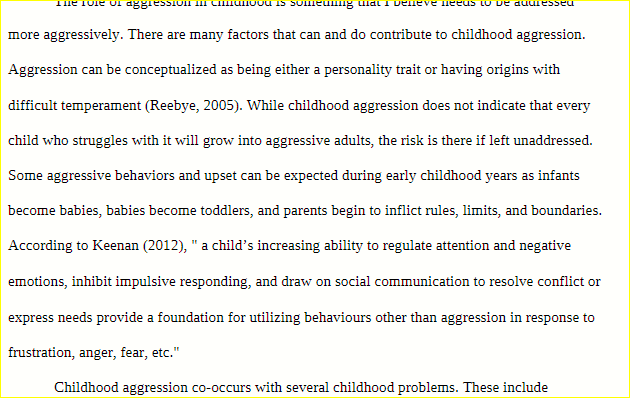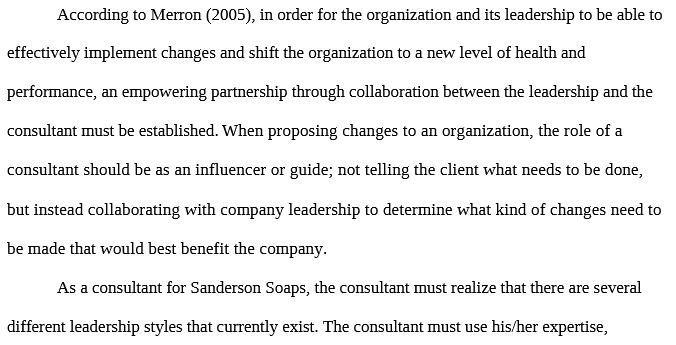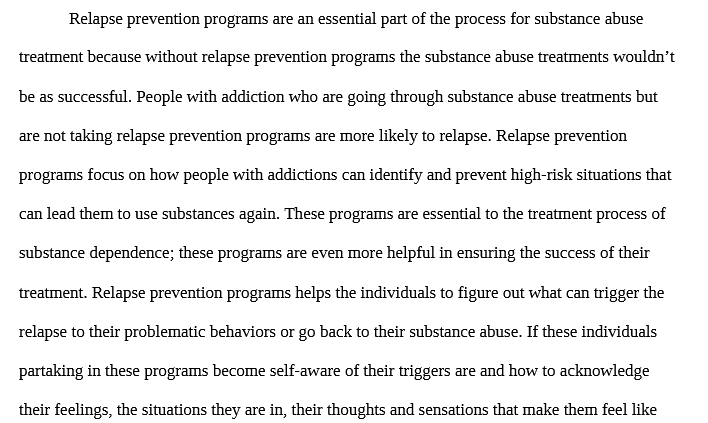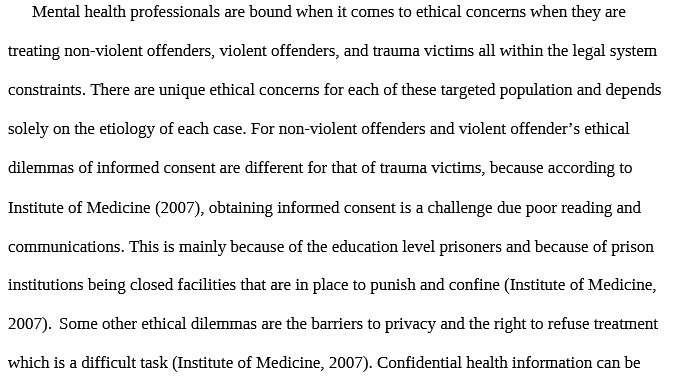psy638 psy/638 psy638_8-1 ShortPaper.docx- Snhu
$3.99
psy638 psy/638 psy638_8-1 ShortPaper.docx- Snhu
The role of aggression in childhood is something that I believe needs to be addressed more aggressively. There are many factors that can and do contribute to childhood aggression. Aggression can be conceptualized as being either a personality trait or having origins with a difficult temperament (Reebye, 2005). While childhood aggression does not indicate that everychild who struggles with it will grow into an aggressive adult, the risk is there if left unaddressed.Some aggressive behaviors and upset can be expected during early childhood years as infants become babies, babies become toddlers, and parents begin to inflict rules, limits, and boundaries.According to Keenan (2012), ” a child’s increasing ability to regulate attention and negativeemotions, inhibit impulsive responding, and draw on social communication to resolve conflict or express needs provide a foundation for utilizing behaviours other than aggression in response tofrustration, anger, fear, etc.”Childhood aggression co-occurs with several childhood problems. These includeemotional dysregulation, negative emotionality, language delays, impulsivity, and more.According to Kate Kennan, 2012, preschool-aged children who have not successfully developed-appropriate strategies for regulating aggressive behaviors are at a very high risk ofdeveloping and engaging in chronic aggressive and antisocial behaviors.
Description
psy638 psy/638 psy638_8-1 ShortPaper.docx- Snhu
The role of aggression in childhood is something that I believe needs to be addressed more aggressively. There are many factors that can and do contribute to childhood aggression. Aggression can be conceptualized as being either a personality trait or having origins with a difficult temperament (Reebye, 2005). While childhood aggression does not indicate that everychild who struggles with it will grow into an aggressive adult, the risk is there if left unaddressed.Some aggressive behaviors and upset can be expected during early childhood years as infants become babies, babies become toddlers, and parents begin to inflict rules, limits, and boundaries.According to Keenan (2012), ” a child’s increasing ability to regulate attention and negativeemotions, inhibit impulsive responding, and draw on social communication to resolve conflict or express needs provide a foundation for utilizing behaviours other than aggression in response tofrustration, anger, fear, etc.”Childhood aggression co-occurs with several childhood problems. These includeemotional dysregulation, negative emotionality, language delays, impulsivity, and more.According to Kate Kennan, 2012, preschool-aged children who have not successfully developed-appropriate strategies for regulating aggressive behaviors are at a very high risk ofdeveloping and engaging in chronic aggressive and antisocial behaviors.
psy638 psy/638 psy638_8-1 ShortPaper.docx- Snhu
Assessment of the Role of AggressionThere is two types of aggression recognized within the psychology community: impulsive and instrumental. Impulsive aggression involves strong emotions, is unplanned, and often occurs in the heat of the moment [ CITATION Bla16 \l 1033 ]. An example would be road rage, i.e. yelling expletives at a driver for almost causing an accident. This form of aggression has been found to be caused by anger attributed to the threat response within the brain[ CITATION Bla16 \l 1033 ]. Instrumental aggression aims to achieve a greater goal and is calculated and planned [ CITATION Lan11 \l 1033 ]. An example of this form of aggression would be armed robbery, i.e. harming someone to obtain money or lucrative goods. In infancy and early childhood, it is normal for children to express anger and aggression through physical behavior such as hitting and biting. Early childhood marks huge cognitive development such as self-awareness, communication, and strides toward independence. Conflicts can arise when independence is stifled by parental control. As the child ages, physical aggressive behaviors increase. Most children learn to regulate aggressive behavior by expressing their feelings in a constructive manner.
psy638 psy/638 psy638_8-1 ShortPaper.docx- Snhu
- PSY 211 – Lifespan Development (5015 Documents),
- PSY 215 – Abnormal Psychology (4335 Documents),
- PSY 108 – Introduction to Psychology (3759 Documents),
- PSY 223 – Statistics for Psychology Research (2652 Documents),
- PSY 216 – Psychology of Personality (1841 Documents),
- PSY 510 – Research Methods (1748 Documents),
- PSY 520 – Research Methods in Psychology II (1469 Documents),
- PSY 257 – Psychology (1451 Documents),
- PSY 310 – Criminal Psychology (1393 Documents),
- PSY 200 – FOUNDATIONS OF ADDICTIONS (1379 Documents),
Only logged in customers who have purchased this product may leave a review.







Reviews
There are no reviews yet.